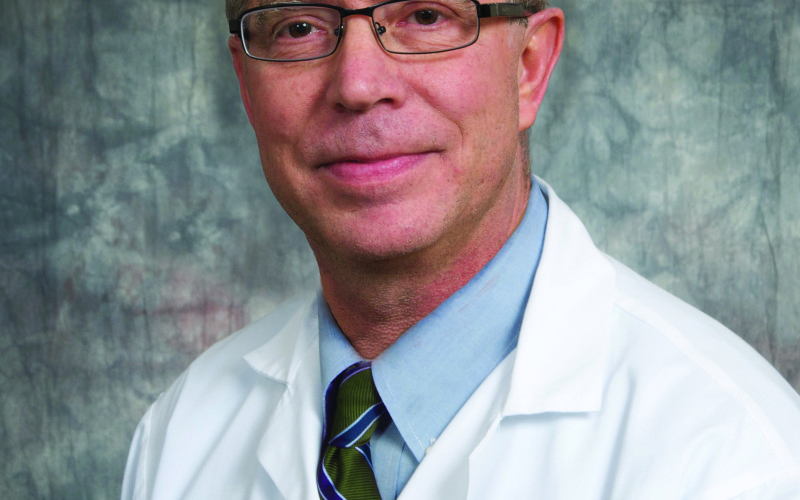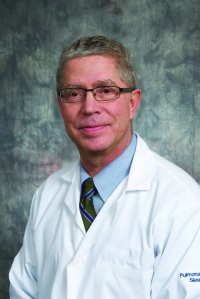Ethics After Work tackles end-of-life planning issues


Conversations about the end of life can be uncomfortable and difficult, even for health professionals.
But overcoming discomfort and initiating those important discussions can mean the difference between seeing a patient or loved one spending those final moments connected to life-prolonging equipment in a sterile room, or peacefully surrounded by family and friends.
That was the focus of April’s Ethics After Work session at the John H. Ammon Medical Education Center, attended by Christiana Care staff and nursing students from the University of Delaware. The event coincided with National Healthcare Decisions Day, when people are encouraged to think about advance care planning and to create an advance care directive.
It’s a message many people don’t want to hear, said pulmonologist John Goodill, M.D., FACP, FCCP, chief of Christiana Care’s Pain and Palliative Care Section, who led the meeting.
“Nobody wants to think about it, so it’s kind of a taboo subject,’’ Dr. Goodill said. “It’s not a fun thing to talk about around the family dinner table.’’
There is fear surrounding death, he said, “but we’re all going to face it, and we may not have time to get ready for it.’’
Dr. Goodill showed the film “Consider the Conversation: A Documentary on a Taboo Subject,” created with private funding by Terry Kaldhusdal, a 6th grade history teacher, and Michael Bernhage, a health care business professional and hospice advocate, both of Wisconsin. The film presents interviews with physicians, patients, clergy, a journalist-author and others, who address issues associated with planning the best possible outcome for each individual.
The film’s goal, its producers say, is to “inspire culture change that results in end-of-life care that is more person-centered and less system-centered.’’ That is a way of thinking that permeates Christiana Care’s approach to caring for our patients as neighbors, Dr. Goodill said.
“We are focused on the patient and patient-centered care,” he said. “The practice of medicine has evolved to be a team effort. We should be listening and acting in a coordinated fashion to assure that the patient and the family have the best information on which to base a plan of care.”
Ideally, the time to think about end-of-life wishes — how much medical intervention is wanted, where and under what circumstances medical care should be given or not — is before a crisis occurs, no matter how difficult it is to imagine, he said.
“This is about facing it with forthrightness, making those decisions.’’
One of the best ways to do that is by creating an advance care directive, also known as a living will, which documents the kind of medical care someone would or would not want to be given in a situation in which the patient is not able to speak for himself.
“There is a general misunderstanding that advance directives are a way that you limit medical care,’’ Dr. Goodill said. “It turns out it’s kind of hard to die these days, because at the end of life, there are so many choices. There’s always another thing that could extend your life. A lot of times, those are false choices that get people into situations they don’t want to be in, where other people are making decisions for them, and those people may or may not know what the person wants.’’
Discussion after the film focused on societal differences that make death unmentionable in some cultures more than others. The group discussed tactics for bringing up the topic with patients and families, and myths surrounding hospice, which provides medical, spiritual and psychological care to people in the last months or weeks of life.
“There’s a perception in American society that hospice equals dying,’’ said Dr. Goodill. “Because of that, people put off hospice care, because nobody wants to join the club of the dying.’’ By postponing hospice until the last few days of life, he said, patients and their families are unable to take advantage of the services hospice offers.
“Hospice is about helping people negotiate the last chapter of life. They help you live as well as you can for as long as you can,’’ he said. “Talking about living as well as possible is pretty positive.’’
For many patients, living as well as possible means palliative care — care that is focused on providing comfort and relieving symptoms, including pain and anxiety. A multidisciplinary palliative care team at Christiana Care provides ongoing medical care along with emotional support and help in making decisions for management of advanced chronic and serious illness.
Hospice also offers palliative care, but generally admission to hospice is limited by insurance coverage to patients considered terminal or within six months of death.
Talking about individual wishes for end-of-life care with respect is life-affirming, Dr. Goodill said. “It’s about paying attention to the experience of the patient facing death, and we need to listen to that.’’
Dying is “a very natural part of living and we’ve kind of ‘over-medicalized it’ … we don’t give it room to happen as it should,” he said.